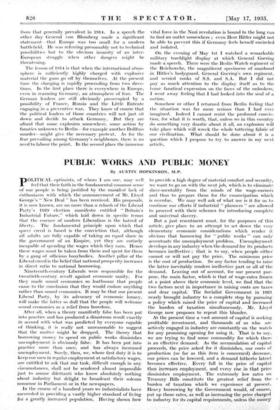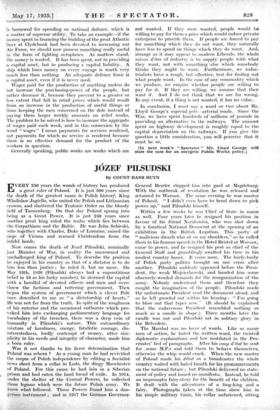PUBLIC WORKS AND PUBLIC MONEY
By AUSTIN HOPKINSON, M.P.
POLITICAL optimists, of whom I am one, may well feel that their faith in the fundamental common sense of our -people is being justified. by the manifest lack of enthusiasm with - which the announcement of Mr. Lloyd George's " New Deal " has more received. His proposals, it is now known, are no more than a rehash of the Liberal Party's 1929 election manifesto entitled " Britain's Industrial Future," which laid down in specific terms that the essence of modern Liberalism is the hatred of liberty. The fundamental principle upon which that queer creed is based is the conviction that, although all adults are fully capable of taking an equal share in the. government of an Empire, vet they are entirely incapable of spending the wages which they earn. Hence those wages must be taken from them and spent for them by a gang of officious busybodies. Another pillar of the Liberal creed is the belief that national prosperity increases in direct ratio to national borrowing.
Nineteenth-century Liberals were responsible for the twentieth-century revolt against economic sanity. For they made sound economics so loathsome that people came to the conclusion that they would endure anything rather than sound economics. It may be that our present Liberal Party, by its advocacy of economic lunacy, will make the latter so dull that the people will welcome sound economics as a relief from boredom.
• After all, when a theory manifestly false has been put into practice and has produced a disastrous result exactly in accord with what was predicted by everyone capable of thinking, it is really not unreasonable to suggest that the matter might be dropped. The theory that borrowing money to spend on public works-diminishes unemployment is obviously false: It-has been put into practice more than once; and has - always increased unemployment. Surely, then, we, whose first duty-it is to keep our men in regular employment at satisfactory wages, are entitled to' ask that our task, difficult enough in any circumstances, shall not be rendered almost impossible just to amuse dilettanti who know absolutely nothing about industry but delight to broadcast their solemn nonsense in Parliament or in the newspapers.
In the course of a hundred years we industrialiSts have succeeded in providing a vastly higher standard of livhig for a greatly increased population. Having shown how to provide a high degree of material comfort and security, we want to go on with the next job, which is to eliminate slave-mentality from the minds of the wage-earners and thus to prepare them for the emancipation. which is overdue. We may well ask of what use is it for us to continue our efforts if industrial " planners " are allowed to proceed with their schemes for introducing complete and universal slavery. • But a just resentment must, for the purposes of this article, give place to an attempt to set down the very eleinentary economic considerations which render it obvious that borrowing for " public works " can only accentuate the unemplOyment problem. Unemployment develops in any industry when the demand for its productS becomes ineffective ; that is to say, when people either cannot or will not pay the price. The minimum price is the cost of production. So any factor tending to raise the latter inevitably renders ineffective part or all of the demand. Leaving out of account, for our present pur- pose, the main factor, which is that of wage-rates frozen at a point above their economic level, we find that the two factors next in importance in raising costs are taxes and dear capital. The Socialist Government in 1931 nearly brought industry to a complete stop by pursuing a policy which raised the price of capital and increased the burden of taxation simultaneously. Mr. Lloyd George now proposes to repeat -this blunder.
At the present time a vast amount of capital is seeking profitable investment, and thousands • of us who are actively engaged in industry are constantly on. the watch for any promising opening for using it. That is to say, we are trying to find some commodity for which there is an effectiird demand: As the accumulation of capital proceeds, the price asked for it diminishes, our costs of production (so far as this item is concerned) "decrease, our prices can. be lowered, and a demand hitherto latent becomes effective. Every fall in. the price of capital thus increases employment, and every rise, in that price diminishes employment. The extremely low rates on Treasury Bills constitute the greatest relief from the burden of taxation which we experience at present. Heavy borrowing by the._ Government would, of course? put up those rates, as well as increasing the price charged, to industry for its capital requirements, unless the money is borrowed for -spending on national defence, which is a matter of supreme utility. To take an example—if the money spent in financing the building of the great Atlantic liner at Clydebank had been devoted to increasing our Air Force, we should now possess something really useful in the form of fighting aeroplanes. As matters stand, the money is wasted. It has been spent, not in providing a capital- asset, but in producing a capital liability. A ship which loses money on every voyage is worth very much less than nothing. An adequate defence force is a capital asset, even if it is never used.
Wages paid for the production of anything useless do not increase the purchasing-power of the people, but rather decrease it, because they prevent to a greater or less extent that fall in retail prices which would result from an increase in the production of useful things or froth keeping the men concerned on the dole instead of paying them larger weekly amounts on relief works. The problem-to be solved is how to increase the aggregate of wages paid each week, and in this connexion by the word " wages " I mean payments f6r services rendered, not payments for which no service is rendered because there is no effective demand for the product of the workers in question.
Generally speaking, public works are works which are not wanted. If they were wanted, people would -be willing to pay for them a price which would induce private enterprise to provide them. If people are forced to pay for something which they do not want, they naturally have less to spend on things which they do want. 'And, strange as it may appear to modern Liberals, the whole raison d'etre of industry is to supply people with what they want, not with something else which somebody thinks they ought to want. Furthermore, we indusz trialists have a rough, but effective, test for finding out what people want. In the case of any commodity which we produce, we enquire whether people are willing to pay for it. If they are willing, we assume that they want it. And I do not think that we _are far wrong. In any event, if a thing is not wanted, it has no value.
In conclusion, I must say a word or two about Mr. Lloyd George's especial pets—arterial roads. Since the War, we have spent hundreds of millions of pounds • in providing an alternative to the railways. The amount spent on highway development is roughly equal to the capital depreciation on the railways. If you give the question a little consideration, you will perceive that it must be so.
[In next week's " Spectator " Mr. Lloyd George will state the case for an energetic Public Works policy.]











































 Previous page
Previous page